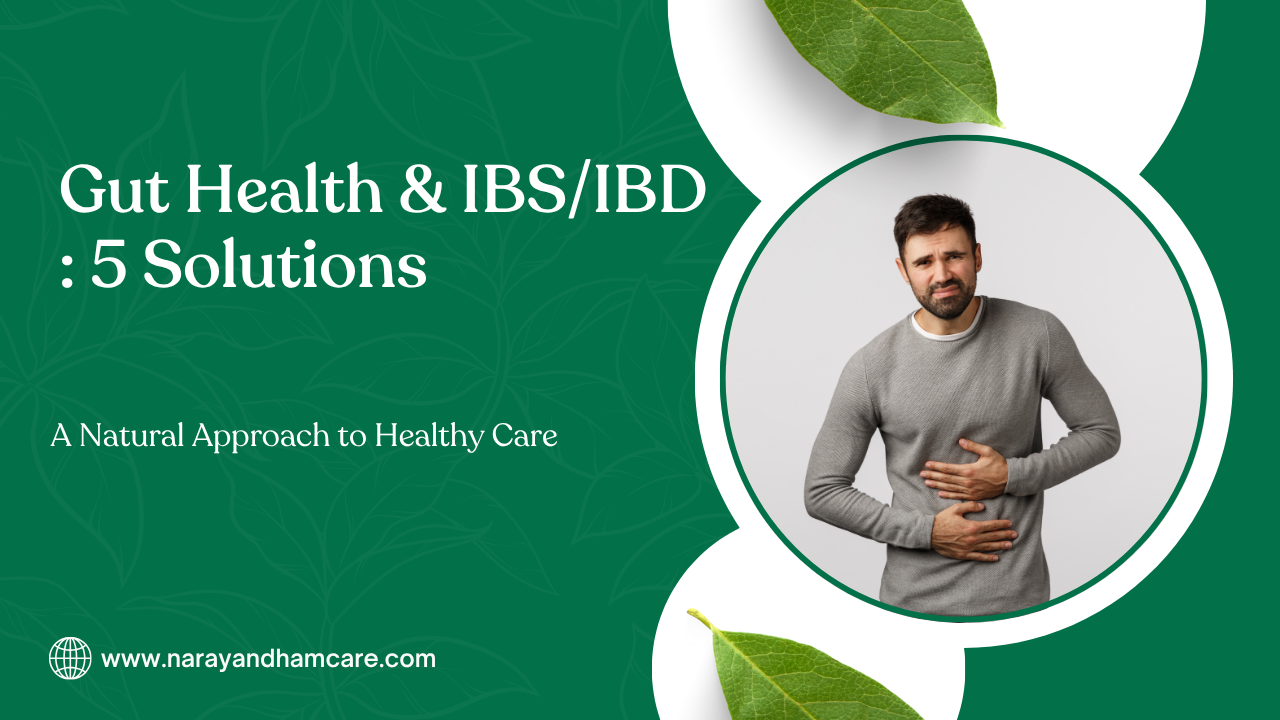IBS/IBD: Introduction
Your gut is a very important part of your body. It helps you break down food, absorb nutrients, and protect your immune system. When your gut is healthy, your whole body feels better.
But if you have problems like IBS (Irritable Bowel Syndrome) or IBD (Inflammatory Bowel Disease), your gut may not work well. Many people don’t know how important the connection is between gut health and IBS, or how to support gut health for IBD patients.
This blog will help you understand:
- What IBS and IBD are
- Why gut health matters
- How to improve your symptoms with food and habits
Problem
Millions of people live with gut issues like IBS and IBD. These conditions cause stomach pain, gas, bloating, and changes in bowel movements. They affect people of all ages and make daily life difficult.
- IBS (Irritable Bowel Syndrome) is a common gut disorder. It changes how your gut moves and feels, but it doesn’t cause damage.
- IBD (Inflammatory Bowel Disease) includes Crohn’s disease and ulcerative colitis. These are serious and cause chronic gut issues and inflammation.
The main problem is that poor gut health can make IBS and IBD worse. That’s why more people are asking questions like:
- What is the link between gut health and IBS?
- Can gut health improve IBS symptoms?
- How does gut health affect IBD?
Symptoms
Here are some signs that your gut may not be healthy, especially if you have IBS or IBD:
- Gas and bloating
- Stomach cramps
- Constipation or diarrhea
- Feeling tired often
- Nausea
- Food sensitivities
- Brain fog
- Mood swings
- Weight loss (common in IBD)
- Fever during flare-ups (common in IBD)
These symptoms can come and go. But when they keep happening, they may be signs of:
- Gut inflammation and IBS
- Leaky gut and IBD
- An unbalanced gut microbiome and IBS
Solution
You can take steps to heal your gut and feel better. Here are practical, simple tips for both IBS and IBD:
A gut-friendly diet for IBS and IBD includes foods that are easy to digest, help reduce inflammation, and support healthy gut bacteria. Try to:
- Eat whole, unprocessed foods
- Add fiber (especially soluble fiber from oats, bananas, and cooked veggies)
- Try fermented foods like yogurt, kefir, and sauerkraut
- Avoid fried foods, sugar, and processed snacks
If you have IBS, try a low FODMAP diet to avoid foods that cause gas and bloating. If you have IBD, try an anti-inflammatory diet with foods like:
- Salmon (rich in omega-3s)
- Leafy greens
- Blueberries
These are some of the best foods for IBS and gut health and help with IBD gut healing.
- Take Probiotics
Probiotics for gut inflammation can help balance your gut bacteria. Some studies show they help reduce symptoms in both IBS and IBD.
Look for probiotic-rich foods like:
- Greek yogurt (with live cultures)
- Kimchi
- Miso
- Fermented pickles
Talk to your doctor before starting probiotic supplements.
- Repair the Gut Lining
The gut lining can become damaged in IBD or with long-term inflammation. Try eating gut lining repair foods such as:
- Bone broth
- Cabbage
- Pumpkin seeds
- Slippery elm (an herb that soothes the gut)
- Aloe vera (in small amounts)
These foods help reduce inflammation and heal the inside of your gut.
- Manage Stress
Stress can make both IBS and IBD symptoms worse. Try these tips:
- Practice deep breathing
- Get regular sleep
- Try gentle exercise like walking or yoga
- Talk to a therapist if needed
- Work With a Specialist
To know exactly how to improve gut health with IBS or how to heal gut with IBD, speak with a doctor or dietitian. They can help you make a custom plan that fits your needs.
-
Frequently Asked Questions (FAQ)
Q1: Can gut health improve IBS symptoms?
A: Yes. A healthy gut with good bacteria can reduce gas, bloating, and irregular bowel movements in people with IBS.
Q2: How does gut health affect IBD?
A: Poor gut health can make IBD worse by causing more inflammation. A healthy gut can help manage flare-ups and improve healing.
Q3: What foods help gut healing in IBS and IBD?
A: Try bone broth, yogurt, oats, cooked vegetables, salmon, and fermented foods. Avoid spicy or heavily processed foods.
Q4: Is gut inflammation linked to IBS?
A: Yes. While IBS doesn’t always cause damage, inflammation from gut imbalance can make symptoms worse.
Q5: Can probiotics help IBS or IBD?
A: In many cases, yes. Probiotics can support gut healing, reduce inflammation, and improve digestion. Always check with your doctor.
-
Conclusion
Gut health is very important, especially if you have IBS or IBD. Poor gut health can make symptoms worse, but the good news is—you can take steps to feel better.
To recap:
- IBS and IBD affect your digestion and gut health
- A healthy gut can reduce flare-ups and symptoms
- A gut-friendly diet for IBS and IBD includes fermented foods, fiber, and anti-inflammatory choices
- Probiotics and gut lining repair foods can help healing
- Managing stress is also key
Start small. Try one healthy gut habit today—drink a glass of water, eat a yogurt, or take a walk. Over time, these small steps can lead to big changes.
Have questions? Want to share your story? Leave a comment below or talk to a gut health expert. Let’s support each other in healing!

